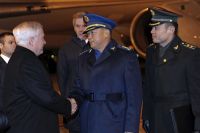BEIJING, Jan. 10, 2011 — The United States and China are world powers that need to cooperate, Defense Secretary Robert M. Gates said here today.
At a news conference with after their meeting at the Bayi Building, Gates and Gen. Liang Guanglie, China’s minister of national defense, spoke of the importance of strong, reliable military-to-military contacts between the nations.
“Our two nations now have an extraordinary opportunity to define our relationship not by the obstacles that at times divide us, but by the opportunities that exist to foster greater cooperation and bring us closer together,” Gates said.
Both men noted that Chinese President Hu Jintao and President Barack Obama want good military-to-military ties between the nations.
Later, Gates met with Chinese Vice President Xi Jinping at the Great Hall of the People. “We’ve seen the United States and Chia cooperate to address several issues on the international front that pose dangers both regionally and across the world,” Gates said to Xi. “These are examples of what we can accomplish when we work together.”
The Chinese cut off military-to-military ties after the U.S. government sold defensive weapons to Taiwan last year. Gates has stressed that the military-to-military relationship must continue in good times and bad.
“We are in strong agreement that in order to reduce the chances of miscommunication, misunderstanding or miscalculation, it is important that our military-to-military ties are solid, consistent and not subject to shifting political winds,” Gates said.
Liang seemed to agree. Through a translator, the Chinese defense minister said both countries desire a healthy military-to-military relationship. “We both recognize that enhancing and maintaining dialogue and communication at all levels is of great significance in the development of military-to-military relations,” Liang said. Both sides share a responsibility to build mutual trust, he added.
The United States and China have more uniting them than dividing them, both men said. The United States and China agreed to cooperate on counterterrorism, counterpiracy, humanitarian operations and disaster assistance. The United States proposed, and the Chinese agreed, to study beginning a strategic security dialogue “as part of a broader strategic and economic dialogue that covers, nuclear, missile defense, space and cyber issues,” Gates said.
The two agreed to pick up and move out on seven high-priority areas for developing military-to-military relations that Gates negotiated with Gen. Xu Caihou, vice chairman of the Central Military Commission, in October 2009. They include high-level visits, institutionalized exchange programs and military education.
The high-level visits will begin soon with Gen. Chen Bingde, the Chinese army’s chief of staff, visiting the United States in the coming months as the guest of Navy Adm. Mike Mullen, chairman of the Joint Chiefs of Staff.
The two men sought to institutionalize and normalize contacts between the two militaries, agreeing that the defense consultative talks, the defense policy coordination talks and the military maritime consultative agreement can serve as important channels of communication between the two nations. Liang announced that the two nations agreed to hold the military maritime working group meeting and the defense policy coordination talks in the first half of this year.
The United States and China also will put together a joint working group that will discuss the guiding principles and framework for military-to-military relations and produce working documents for approval.
Gates and Liang both stressed that the cooperation will expand mutual interests and avoid misunderstanding and miscalculation.
China and the United States share many common interests and concerns that can best be addressed cooperatively, Gates said, noting that the two nations can work together addressing the challenges posed by the spread of nuclear, space, cyber and missile technology. They also can work to maintain peace and security on the Korean peninsula by facilitating engagement between the two Koreas and working toward the de-nuclearization of the Korean peninsula, he added.
China and the United States also can cooperate to prevent Iran from obtaining a nuclear weapon and to defuse global conflicts and tensions.
U.S. service members can expect more joint exercises with the Chinese military.
“Not only will joint exercises improve key capabilities on both sides,” Gates said, “they will also lead to safer practices for our sea and air forces and over time cultivate trust and lead to more opportunities for defense cooperation.”
Source:
U.S. Department of Defense
Office of the Assistant Secretary of Defense (Public Affairs)

 von
von 